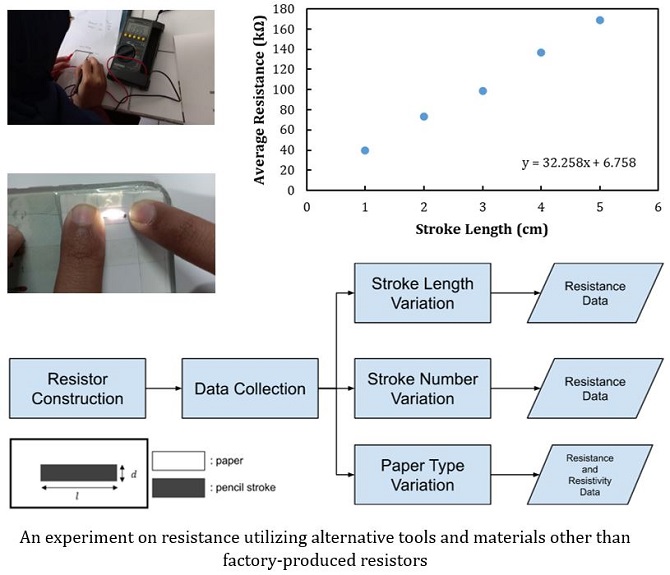
Implementation of Research-Based Learning for Prospective Physics Teachers: A Case Study
Abstract
Prospective physics teachers must have research skills because they will later utilize and transfer these skills throughout their teaching careers. However, research shows that students' research skills, including in Indonesia, are still low. In addition to equipping students with theoretical research knowledge, an emphasis is needed on the practical stage for prospective teachers in obtaining research skills. Using a reflective case study approach with qualitative methods, this research observes and describes the implementation of research-based learning for prospective physics teachers. The research-based learning was implemented through an experiment on resistance utilizing alternative tools and materials. Data was collected through participant observation from four participants, with the researcher as the main instrument. This study shows that the implementation of research-based learning provides an opportunity for prospective physics teachers to practice research skills and apply the scientific method to solve problems. More studies are needed regarding implementing research-based learning, especially in higher education.
Full Text:
Download PDFReferences
DeHaan, R. (2009) Teaching creativity and inventive problem solving in science. CBE—Life Sciences Education, 8(3), 172 – 181.
Diggle, P. J., Chetwynd, A., & Chetwynd, A. G. (2011). Statistics and scientific method: an introduction for students and researchers. Oxford University Press.
Dörnyei, Z. (2007). Research methods in applied linguistics. New York: Oxford University Press.
Given, L. M. (Ed.). (2008). The Sage encyclopedia of qualitative research methods. Sage publications.
Hamilton, L., & Corbett-Whittier, C. (2012). Using case study in education research. Sage.
Huy, D. T. N., & Thuy, N. T. (2021). Education for students to enhance research skills and meet demand from workplace-case in vietnam. Ilkogretim Online, 20(4).
Inyeo, C., & Wattanakasiwich, P. (2021). Pencil on paper as low cost alternative resistors. J. Phys.: Conf. Ser., 4(1).
Kapon, S. (2016). Doing research in school: Physics inquiry in the zone of proximal development. J. Res. Sci. Teach, 53(8), 1172–1197.
Laidlaw, A., Aiton, J., Struthers, J., & Guild, S. (2012). Developing research skills in medical students: AMEE Guide No. 69. Medical teacher, 34(9), 754-771.
Mcgloin, S. (2008). The trustworthiness of case study methodology. Nurse Researcher, 16(1), 45-55. doi: 10.7748/nr2008.10.16.1.45.c6752
Meerah, T. S. M., Osman, K., Zakaria, E., Ikhsan, Z. H., Krish, P., Lian, D. K. C., & Mahmod, D. (2012a). Developing an instrument to measure research skills. Procedia-Social and Behavioral Sciences, 60, 630-636.
Meerah, T. S. M., Osman, K., Zakaria, E., Ikhsan, Z. H., Krish, P., Lian, D. K. C., & Mahmod, D. (2012b). Measuring graduate students research skills. Procedia-Social and Behavioral Sciences, 60, 626-629.
Mitchell, M. (2009). Complexity: A Guided Tour. Oxford: Oxford University Press.
Murdoch-Eaton, D., Drewery, S., Elton, S., Emmerson, C., Marshall, M., Smith, J. A., ... & Whittle, S. (2010). What do medical students understand by research and research skills? Identifying research opportunities within undergraduate projects. Medical teacher, 32(3), e152-e160.
Murtonen, M., Olkinuora, E., Tynjälä, P., & Lehtinen, E. (2008). “Do I need research skills in working life?”: University students’ motivation and difficulties in quantitative methods courses. Higher Education, 56, 599-612.
Musante, K., & DeWalt, B. R. (2010). Participant observation: A guide for fieldworkers. Rowman Altamira.
Nurlaelah, I., Widodo, A., Redjeki, S., & Rahman, T. (2020, March). Student’s research skills in middle school of Kuningan district. In Journal of Physics: Conference Series (Vol. 1521, No. 4, p. 042105). IOP Publishing.
Nurzaman, I., Trimayanti, E., Zainuddin, E. S., & Khotimah, S. N. (2018). Rangkaian Listrik Menggunakan Isi Pensil. Prosiding SNIPS, 8–12.
Quintão, C., Andrade, P., & Almeida, F. (2020). How to Improve the Validity and Reliability of a Case Study Approach?. Journal of Interdisciplinary Studies in Education, 9(2), 264-275.
Riege, A. (2003). Validity and reliability tests in case study research: a literature review with “hands‐on” applications for each research phase. Qualitative Market Research, 6(2), 75-86. doi: 10.1108/13522750310470055
Roito, E., Solihat, R., & Wulan, A. R. (2019). Pencapaian Keterampilan Meneliti Abad Ke-21 Peserta Didik SMA pada Pembelajaran Ekosistem melalui Step-By-Step Model Experiment. Assimilation: Indonesian Journal of Biology Education, 2(1), 14-18.
Sears, F. W., Zemansky, M. W., Young, H. D., & Freedman, R. A. (2001). Fisika Universitas Edisi Kesepuluh Jilid 2. Erlangga: Jakarta.
Solihat, R., Rustaman, N., Widodo, A., & Saefudin, S. (2015). Keterampilan Riset Mahasiswa Biologi dan Pendidikan Biologi; Analisis Berdasarkan Refleksi Personal. Metodik Didaktik: Jurnal Pendidikan Ke-SD-an, 9(2).
Street, C. T., & Ward, K. W. (2012). Improving validity and reliability in longitudinal case study timelines. European Journal of Information Systems, 21(2), 160-175. doi: 10.1057/ejis.2011.53
Şahan, H. H., & Tarhan, R. (2015). Scientific research competencies of prospective teachers and their attitudes toward scientific resea. International Journal of Psychology and Educational Studies, 2(3), 20-31.
Taşdemir, A. (2013). The nature of science and scientific process skills. In M. Demirbaş (Eds.), The Nature of Science and its Teaching. Ankara: Pegem Academy.
Turiman, P., Omar, J., Daud, A. M., & Osman, K. (2012). Fostering the 21st century skills through scientific literacy and science process skills. Procedia-Social and Behavioral Sciences, 59, 110-116.
Walkington, H., Griffin, A. L., Keys-Mathews, L., Metoyer, S. K., Miller, W. E., Baker, R., & France, D. (2011). Embedding research-based learning early in the undergraduate geography curriculum. Journal of Geography in Higher Education, 35(3), 315-330.
DOI: https://doi.org/10.17509/jsl.v6i4.57589
Refbacks
- There are currently no refbacks.
Copyright (c) 2023 Handina Handina, Siti Nurul Khotimah

This work is licensed under a Creative Commons Attribution-ShareAlike 4.0 International License.


Jl. Dr. Setiabudhi 229 Bandung 40154, West Java, Indonesia











